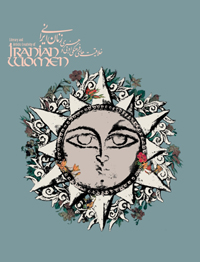|
Speakers
|
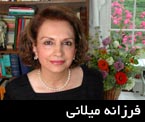
|
Iranian Women Writers and the
Public Sphere Professor Farzaneh
Milani, University of Virginia
|
| Born and raised in
Teheran, Iran, Farzaneh Milani attended French primary and secondary
schools. She earned her BA in French Literature in 1970 from
California State University at Hayward. Transferring to the
University of California in Los Angeles, she completed her graduate
studies in Comparative Literature in 1979. Her dissertation,
Forugh Farrokhzad: A Feminist Perspective, was a critical study
of the poetry of a pioneering Iranian woman poet. Milani taught
Persian Language and Literature at UCLA for four years before coming
to the University of Virginia in 1986. Past president of the
Association of Middle Eastern Women Studies in America, Milani was
the recipient of Alumni Teaching Award in 1998. She is the author of
"Veils and Words: The Emerging Voice of Iranian Women Writers," "A
Cup of Sin: Selected Poems of Simin Behbahani" (with Kaveh safa),
She has served as the guest editor of two special issues of "Nimeye
Digar on Simin Daneshvar and Simin Behbahani. Milani has written
over 60 articles, book chapters, introductions, and afterwards in
Persian and English and lectured at over 100 colleges and
universities nationally and internationally. Her poems have been
published in "Nimeye Digar," "Par," "Barrayand," "Daneshju," "Omid,"
and "Avaye Portland." Currently, she is Director of Studies in Women
and Gender and Professor of Persian and Women Studies at the
University of Virginia in Charlottesville. She teaches courses in
Persian literature and cinema, Islam, and cross-cultural studies of
women. |
Women in Contemporary Iran
Shahla Lahiji
|
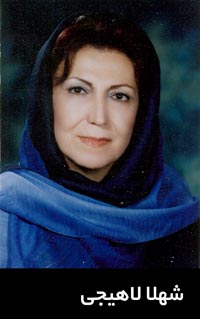
|
|
Shahla Lahiji,
the founder and director of Roshangaran and Women's Studies
publishing, is known as active researchers in the issues related to
women in Iran particularly journalism and writing. She is a graduate
of Open University of London in the field of Sociology. She is the
author of “Woman's Image in the works of Bahram Beizaei,"
"Understanding the Iranian woman’s identity in pre-historic historic
periods" (written with the cooperation of Mehrangiz kar), and "Woman
in search of freedom: rise and fall of women's movement in German
social democracy" (written with the cooperation of Farideh Assarpour.
While the
situation of women in contemporary Iran has been one of the hottest
issues among international circles, Lahiji explains that “in spite
of a only the deficiencies are emphasized.” In her talk she argues
that “the continuous efforts of our women to participate in all
social activities in the areas which have not been previously
achievable are easily dismissed. This includes film making and
related careers, where the Iranian women has pondered, researched,
studied, and talked about her shortages and claimed her rights.
Being engaged in this career for less than ten years, these women
are working in very challenging conditions which imposes limitations
on them. Nevertheless, they work has been welcomed by public and
they have been more successful than their male counterparts in
picturing a more realistic image of Iranian society.”
|
|
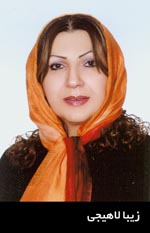
|
Women in
Contemporary Iran: Problems and Challenges
Ziba Abdolahzadeh Lahiji
|
|
Ziba
Abdollahzadeh Lahiji is a graduate of Educational Sciences from
Tehran University. She has worked as social worker with the State’s
Welfare Organization as an expert on mentally and physically
challenged, and the victims of social harm. She is presently the
manager of Roshangaran Women's Studies Publishing. In her
talk, she will reflect on her a twenty-four-year work experience
working with women victims. She will examine means of population
development, political participation, and social empowerment of
women in Iran. She will also reflect on problems and challenges
associated with violence against women, domestic violence,
addiction, prostitution, runaway girls, mental and behavioral
disorders, health problems, suicide, singleness, and divorce. As
women's participation has a relatively improved after the
revolution, the above problems and challenges associated with this
participation have also increased. This talk will analyze how the
Iranian government has been trying to hide its incapability in
solving these problems.
|
Iranian Women’s
Employment Initiatives: Difficulties and Challenges
Firouzeh Saber
|
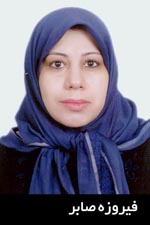
|
|
Firoozeh Saber is
a graduate with a B.A degree of Business Administration from Alzahra
University and her Master's degree in Executive Management. She has
been working on employment initiatives for women in Iran mainly job
creation. She has conducted many researches in this field including
“ the National Project of Promoting Job Creation and Rehabilitation
of Job Creating Women"( for the Ministry of Interior); the project
of "Rehabilitation of the Capability and Promoting the Job Creating
Potential of Women Graduates" (for the Ministry of Sciences Research
and Technology); “Development Plans of Women's Job Creation in Iran”
(for the Industrial Management Organization); and “Study of Women's
Role in Higher Education” (for the Ministry of Sciences, Research
and Technology). Firoozeh Saber has also held many job creation
workshops, job opportunities search workshops, and classes for women
in the field of management. In her endeavors towards this objective,
Firoozeh Saber, has written and published a book under the tile
"Methods of Developing the Job Creation of Women in Iran".
Saber emphasizes,
"Women constitute approximately half of the country's population and
allocate a considerable part of the active economic population to
themselves. Their proportion in the educated society has an
ascending trend. However, they have not possessed a proper share in
the national economy yet. The young age composition, increase in the
share of women's presence in the universities, and higher education
institutes and on the other hand the low ratio rate of women's
activities, job deficiency and unemployment increase, job
limitations in public sector together with the emergence of creative
ideas, all require a ground on which the job creative activities
could be developed. The research carried out on five job-creating
women in Iran shows some common limitations existing among them. A
study on the performance of job creating women indicates that they
have passed through the boundaries of problems set for them and have
been able to pave their way towards achieving their objectives by
creating works and adopting new policies. Having knowledge over
successful models shall pave the way for encouragement and
improvement of women’s job creation in Iran.
|
|
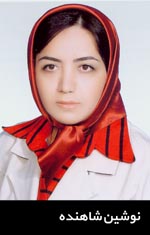
|
Philosophy as a
New Sphere for Iranian Women
Nushin Shahandeh
|
|
A graduate of
Master's of philosophy from Allameh Tabatabaei University, Shahandeh
is interested in feminist interpretation of different philosophical
views. Shahandeh’s first book titled "Woman in Niche's Opinion" was
followed by her translation of Christian Dopisam "The City of
Women", soon to be published. Shahandeh is very much so interested
in feminist critiques of existing discourses in literature,
political sciences, and social sciences. In her talk she wills
examine and emphasizes the ascending trend of feminist writings in
the area of philosophy internationally in past two decades.
|
Women and Drama in
Contemporary Iranian Theater
Chista Yasrebi
|
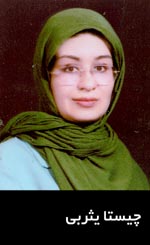
|
|
Chista Yasrabi,
the famous playwright is a graduate of educational psychology and a
Ph.D. student of psychology. Being a writer, journalist, playwright,
poet and university lecturer, she began her professional playwriting
from 1989 with a play called "Tomorrow may be the spring". She has
been much appreciated and won many prizes at Fajr Theatre Festivals
as a playwright and director. She is a member of the Board of
Directors of the Society of Playwrights of Iran's Theatre House and
in-charge of the international committee of the Society of
Playwrights. Recently, Chista Yasrabi won the award for the best
play at the Literary Festival of Parvin Etesami. She has written or
translated thirty five books in the related fields to drama.
In her talk, she
has concentrated on studying the vast and creative presence of women
in Iran’s present theatre and concentrated on initiation of special
structural approaches. She believes that playwriting of Iranian
women during the recent years have undergone dramatic transformation
both in the content and in the structure, one which has created a
new and realistic approach in Iran’s theatre. The women playwrights
may be rightly named as the founders of this great transformation.
Study of the women’s playwriting would not be possible without
reviewing the ups and downs as well as the changes of the society in
which these women are writing their work.
Saber emphasizes,
"Women constitute approximately half of the country's population and
allocate a considerable part of the active economic population to
themselves. Their proportion in the educated society has an
ascending trend. However, they have not possessed a proper share in
the national economy yet. The young age composition, increase in the
share of women's presence in the universities, and higher education
institutes and on the other hand the low ratio rate of women's
activities, job deficiency and unemployment increase, job
limitations in public sector together with the emergence of creative
ideas, all require a ground on which the job creative activities
could be developed. The research carried out on five job-creating
women in Iran shows some common limitations existing among them. A
study on the performance of job creating women indicates that they
have passed through the boundaries of problems set for them and have
been able to pave their way towards achieving their objectives by
creating works and adopting new policies. Having knowledge over
successful models shall pave the way for encouragement and
improvement of women’s job creation in Iran.
|
|
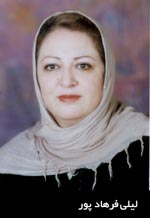
|
Contemporary
Iranian Women Journalists
Lili Farhadpour
|
|
Lili Farhadpour
is a graduate of Journalism from Alameh Tabatabaei University of
Tehran. She has been cooperating with Iranian press working as a
journalist for fifteen years. She was the editor of Literature and
Art desk of newspapers such as Jamea, Toos, Neshat, and Asre
Azadegan, which have all been shut down. She was also a member of
the editorial board of journals like Takapoo, Jamea Salem,
Hambastegi and Tosea dailies. Farhadpour has also been the
editor-in-chief of monthly journals Meya’r and Cha’p Va
Enteshar including the weekly feminist journal Fekre Rooz. Since
most of the newspapers she has worked at have been shut down
Farhadpour is now concentrating on writing fictions. The books
written by her include “Berlin Women”, “A Window with Blue Glasses
Facing the Back Ally”, “Striped Saturdays and Leaden Seconds.”
Elaborating on her speech, she says, "This article is a review of
gender roles of women who choose journalism as a career in the
present situation of Iran. I will argue that women journalists in
Iran can use the particularities of this career as an access tool
and means of power control and activism. Due to the extraordinary
political stand of Journalism, it can be utilized by women activists
in their quest for equality.
|
Roundtable on
Narrative Literature in Contemporary Iran
Chair: Farzaneh Milani,
University of Virginia
|
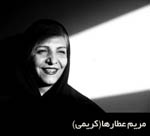
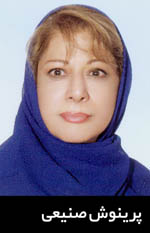
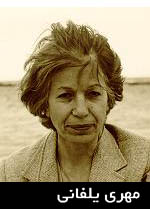 |
|
Mahnaz Attarha Karimi
Author of Such Dance and Sang va Sanubar
Mahnaz Karimi was
born in Kashan. She worked as a journalist until she was
forty-years-old. She published her first novel, "Such Dance," at the
age of forty. The novel "Sanj and Sanoobar", published in 2003,
gained great popularity and was chosen as a candidate for many
different prizes in 2004.
Parinoush Sani’i
Author of Muhim Man
Parinoosh Saniei,
is the writer of the very successful book “My Share”. This book has
been published eight times in less than two years.
Mehri Yalfani
Author of Khaneh Dur Ast, Afsanah-’i Khak, and Mah
Mehri Yalfani was
born in Hamedan. She has a Bachelor's degree in Electrical
Engineering and she worked in the Ministry of Energy, Khuzistan’s
Water and Power Organization, and Tehran Cement Company for twenty
years before becoming a professional writer. The first collection of
stories written by Mehri Yalfani, was written in 1966 under the name
of “Good Days" and the long story “Before Autumn" was written and
published after 15 years. In 1984, she immigrated to France and then
to Canada where she is residing now. She is the author of "Dance in
front of a broken mirror" published in Iran by Niloofar
Publications; "Far from home" published by Iran Ketab Publications
in USA and reprinted by Sholeh Andisheh Publications in Iran. Two
other collections of short stories under the names of "Parastoxxx "
and "Two sisters" and the novel "myth" (written in English Language)
written by Mehri Yalfani, have also been published.
|
Documentaries
A Day in the Life
of Saray
|
|
This
documentary film is the narration of the daily life of a woman from Bezin, a village of Khodabandeh
located in Zanjan
Province. In spite of the deeply traditional culture of the region,
this woman has been able to break the barriers of traditions and
engage in a male-dominant career which belongs to the men even in
the urban areas. Her job is selling and repairing motorcycles and
she herself is a skilled motorcyclist. In addition, she is a
job-creator and many villagers work for her. She has been appointed
as the exemplary farmer of Zanjan province for three consecutive
years. She has also completed a training course of rural midwifery
and thus is able to deliver many newborns in her village as well as
the surrounding villages.
|
A Day in the Life
of Zinat
|
|
Zeinat Daryaei, a
woman from Salkh village located in Gheshm Island, started her
social work by working in Health House as a nurse-assistant. As
result, she also takes off her "Borgha", a veil for covering the
faces of women in South Iran. Although her work was opposed by the
people of her village as well as her own family in the beginning,
today, she enjoys such a great popularity that she acquired the
highest number of votes given by people in the elections of City and
Village Islamic Councils.
|
Dialogue in a Fog
|
|
Problems and obstacles existing for
the women political and social participation are not limited to
gender discriminations in the legal and political laws and
regulations. The biggest impediment, are rooted in the everyday
patriarchal cultural. A woman called Azar from rural district of
Hashtgerd Sofla, a village in the suburbs of Ghazvin province, has
been appointed as a candidate for the city council. But, Kadkhoda
who is the Chairman of the association evades from holding the
meetings because Azar is a woman and so the rest of story goes on…. |
|
